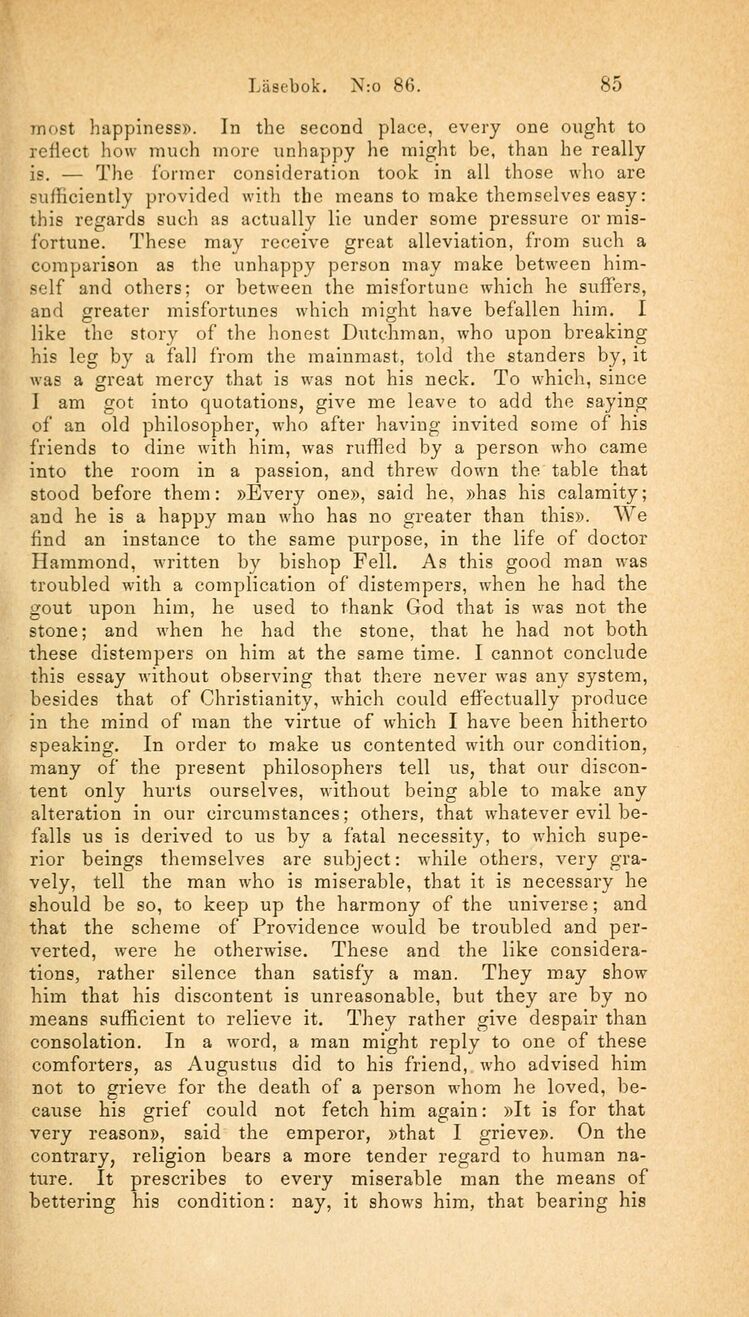
Full resolution (JPEG) - On this page / på denna sida - Läseboken - 86. On Contentment

<< prev. page << föreg. sida << >> nästa sida >> next page >>
Below is the raw OCR text
from the above scanned image.
Do you see an error? Proofread the page now!
Här nedan syns maskintolkade texten från faksimilbilden ovan.
Ser du något fel? Korrekturläs sidan nu!
This page has never been proofread. / Denna sida har aldrig korrekturlästs.
Läsebok. N:o 76 — 77.
85
most happiness». In the second place, every one ought to
reflect how much more unhappy he might be, than he really
is. — The former consideration took in all those who are
sufficiently provided with the means to make themselves easy:
this regards such as actually lie under some pressure or
misfortune. These may receive great alleviation, from such a
comparison as the unhappy person may make between
himself and others; or between the misfortune which he suffers,
and greater misfortunes which might have befallen him. I
like the story of the honest Dutchman, who upon breaking
his leg by a fall from the mainmast, told the ständers by, it
was a great mercy that is was not his neck. To which, since
I am got into quotations, give me leave to add the saying
of an old philosopher, who after having invited some of his
friends to dine with him, was ruffled by a person who came
into the room in a passion, and threw down the table that
stood before them: »Every one», said he, »has his calamity;
and he is a happy man who has no greater than this». We
find an instance to the same purpose, in the life of doctor
Hammond, written by bishop Fell. As this good man was
troubled with a complication of distempers, when he had the
gout upon him, he used to thank God that is was not the
stone; and when he had the stone, that he had not both
these distempers on him at the same time. I cannot conclude
this essay without observing that there never was any system,
besides that of Christianity, which could effectually produce
in the mind of man the virtue of which I have been hitherto
speaking. In order to make us contented with our condition,
many of the present philosophers tell us, that our
discontent only hurts ourselves, without being able to make any
alteration in our circumstances; others, that whatever evil
befalls us is derived to us by a fatal necessity, to which
superior beings themselves are subject: while others, very
gravely, tell the man who is miserable, that it is necessary he
should be so, to keep up the harmony of the universe; and
that the scheme of Providence would be troubled and
perverted, were he otherwise. These and the like
considerations, rather silence than satisfy a man. They may show
him that his discontent is unreasonable, but they are by no
means sufficient to relieve it. They rather give despair than
consolation. In a word, a man might reply to one of these
comforters, as Augustus did to his friend, who advised him
not to grieve for the death of a person whom he loved,
because his grief could not fetch him again: »It is for that
very reason», said the emperor, »that I grieve». On the
contrary, religion bears a more tender regard to human
nature. It prescribes to every miserable man the means of
bettering his condition: nay, it shows him, that bearing his
<< prev. page << föreg. sida << >> nästa sida >> next page >>